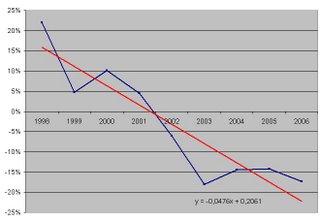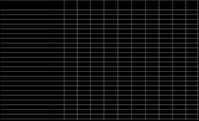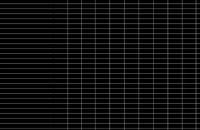AIO, an interested observer, is a log time reader of this blog who on occasion did even post as a guest. He sends me this item which is rather interesting about where Venezuela really does rank. Let us just say that all that shines ain't necessarily gold. Quite a piece of work, by the way. And quite appropriate for the folks that are visiting Venezuela these days.
---------------------------------------------------
After
analyzing where poverty rates were going under Chavez (and determining that they were not going in the right direction), I decided to look into the opinions of others, more credible than I, as to the “rumbo” of Venezuela in other ways. To answer the question, “Are things getting better?” I turned to several international observers (people like me?
J) for their answers. I found organizations which use various ranking systems. Following is a list of those organizations, a brief description of them, and their numbers for Venezuela. All with links, of course!
But first, here is the trend since 1998:

This isn’t the most technical depiction, but it gives a pretty accurate sense of the progression. I took the average score for each organization, then compared each year’s result to that average, in terms of percent above or below.I averaged all of the averages for each year to obtain an annual result. Not the most scientific method, but I’m comparing apples to apples, so to speak, since I’m using the same rankings. As you can see, it’s been steadily going down for some time. The equation on the chart is for the trend line, and shows that the average percentage score of my calculation has been dropping 4.8% per year since 1998.
First, let’s start with a big one: the World Bank. The WB doesn’t create their own rankings, but compiles a ranking from several sources (being careful to statistically control for correlation between sources, for example – see here). Here are the WB scores (these are percentile marks – the number represents what percentage of countries rank worse than Venezuela. In other words, high numbers are good, low numbers bad.):
World Bank, governance listing 1996 1998 2000 2002 2003 2004 2005
Voice and Accountability 51.0 54.6 41.1 35.3 35.3 35.4 31.9
Political Stability----- 17.9 29.2 25.5 13.7 12.7 13.6 11.8
Government Effectiveness 20.5 16.3 17.7 11.5 12.4 15.9 23.0
Regulatory Quality------ 37.3 46.3 23.2 31.0 12.3 9.9 12.4
Rule of Law-------- 28.7 29.8 19.2 13.0 10.6 12.6 9.2
Control of Corruption--- 24.9 17.6 28.4 15.2 9.3 14.3 16.7
Next, Transparency International, a well-known NGO. They have rankings on transparency, which rate “more than 150 countries in terms of perceived levels of corruption, as determined by expert assessments and opinion surveys” (TI’s words). Venezuela’s rankings (which show Venezuela’s position out of the total number of countries) and scores (high scores are good): 2006, tied for 138 of 163 (2.3) 2005, tied for 130 of 159 (2.3) 2004, tied for 114 of 145 (2.3) 2003, tied for 100 of 133 (2.4) 2002, tied for 81 of 102 (2.5) 2001, tied for 69 of 91 (2.8) 2000, tied for 71 of 90 (2.7) 1999, tied for 75 of 99 (2.6) 1998, tied for 77 of 85 (2.3) 1997, 44 of 52 (2.77) 1996, 48 of 54 (2.50) 1995, 38 of 41, (2.66) Note that scores improved under Chavez for a few years, before turning around after 2001. Also very intriguing is TI’s Global Corruption Barometer. See page 21, where 59% of people polled think corruption has increased “a lot” over the last three years, as opposed to 12% who think it has decreased (and only 1% say decreased “a lot”). Also, 62% expect corruption to continue to increase over the next three years (up from 44% in 2004; see page 10). Then there is the WB’s report on “Doing Business” in various countries, where Venezuela ranked 120 of 155 in the last report published, with very low scores in “Paying Taxes,” “Protecting Investors,” “Enforcing Contracts” and “Closing a Business.” Now a couple organizations that measure civil liberties, starting with Reporters Without Borders, “an association officially recognized as serving the public interest” and “Defending press freedom...every day.” Their freedom of the press position and scores (low score better): 2006: 115 of 168 (29.00) 2005: tied for 90 of 167 (23.00) 2004: 90 of 167 (24.63) 2003: 96 of 166 (27.83) 2002: 77 of 139 (25.00) Not much change, really, but Freedom House ratings tell a different story. Freedom House is “an independent non-governmental organization that supports the expansion of freedom in the world.” Their “About Us” statement is a very good read. Their scores (low is good) and rankings for press freedom show a large change since 2003. (Does anyone recall what was momentous for the press that year? Yep, la Ley Resorte.) 2006: 72 tied for 158 of 194 2005: 72 tied for 159 of 194 2004: 68 tied for 150 of 193 2003: 68 tied for 147 of 193 2002: 44 tied for 95 of 186 2001: 34 tied for 77 of 187 2000: 34 tied for 75 of 186 1999: 33 tied for 72 of 186 1998: 33 tied for 73 of 186 1997: 32 tied for 68 of 187 1996: 31 tied for 65 of 187 1995: 49 tied for 91 of 185 1994: 30 tied for 57 of 183 Freedom House also rates “Political Rights and Civil Liberties” (again, low score is good, from 1-7), where things headed in the wrong direction beginning in 1999: 2006: PR 4, CL 4 2005: PR 3, CL 4 2004: PR 3, CL 4 2002: PR 3, CL 4 2001: PR 3, CL 5 2000: PR 3, CL 5 1999: PR 4, CL 4 1998: PR 2, CL 3 1997: PR 2, CL 3 1996: PR 2, CL 3 The Fund for Peace has an unusual category: states at-risk for failure (low score, higher risk of failure). In 2005, Venezuela was 21 out of 76 (#1 was Cote d’Ivoire, the most likely to fail); in 2006, 64 of 146. In 2005, Venezuela was tied for worst in “Uneven Economic Development along Group Lines,” tied for 4th in “Criminalization or Delegitimization of the State,” tied for 7th in “Widespread Violation of Human Rights,” and only 74th in “Rise of Factionalized Elites.” (If I had a dollar for each time I had seen that blamed as the root of Venezuela’s problems, even just here on this blog, I might be able to retire.) On the good side, most scores improved from 2005 to 2006, which raised the ranking, and improved the score on my chart considerably. The next several rankings are all economic in focus, starting with the World Economic Forum’s Growth Competitiveness Index. Venezuela’s percentile ranking is actually climbing under this index. However, it is partly because previously unranked nations are entering at the bottom (nine of them in 2005, eight in 2006), pushing Venezuela upward (and making the overall score in the chart I made look better). Venezuela earned its own paragraph in the latest report (page 12), having the worst score in the world in government institutions, and being singled for poor education and infant mortality results. 2006: 88 of 125 2005: 89 of 117 2004: 85 of 104 2003: 82 of 101 2002: 68 of 80 On to the Index of Economic Freedom, published by the Heritage Foundation. I know this is a very conservative organization (so I’m glad they only focus on economics in their rankings), but read a bit of their methodology to see that rankings on this list are anything but arbitrary. Venezuela has been moving quickly downward since its best score in 2000, reaching in the last three years the dubious achievement of economically “repressed.” Economic freedom, Heritage Foundation (low score better) 2006: tied (with Libya) 152 of 157 4.16 2005: tied (with Haiti) 146 of 155 4.09 2004: 147 of 155 4.23 2003: 133 of 156 3.76 2002: 136 of 155 3.93 2001: tied for 123 of 155 3.78 2000: tied for 96 of 161 3.38 1999: 99 of 161 3.43 1998: 99 of 156 3.48 1997: tied for 99 of 150 3.53 The Kurtzman Group “is a consulting and advisory firm dedicated to helping companies improve their performance and visibility in the marketplace” and “specializes in thought leadership that creates value and sustainable growth.” They rank opacity, i.e. business and investment risk, and also provide an “opacity premium” – the higher prospective return required to conduct business in Venezuela rather than the U.S. or Australia. Venezuela’s premium is 6.56% (Colombia’s, for comparison, is 4.81%). (2001 report here.) Venezuela got the worst score in the list in effective legal system in 2004, the most recent report. 2004: 46 of 48 2001: 22 of 35 Moving on to the IMD International BusinessSchool> (in Switzerland), which publishes annual (I couldn’t find a couple years online) competitiveness rankings. Ironically, while Venezuela is consistently at the bottom in this ranking, it improves their score in the graph I made, since each score is very close to the average on this scale! 2006: 61 of 61 2005: 60 of 60 2004: 60 of 60 2001: 49 of 49 2000: 46 of 47 (ahead of only Russia) 1999: 47 of 47 1998: 46 of 46 1997: 44 of 46 Last in strict economics is the Fraser Institute, which has created the “Economic Freedom of the World report.” Some highlights: Venezuela gets lumped with only Zimbabwe, Myanmar, and the Republic of Congo in the intro as “nations that have registered losses in economic freedom since 1980”; and “Integrity of Legal System” and “Impartial Courts” went from 6.7 and 3.7 in 2000 all the way to 1.7 and 0.7 in 2003. This index goes further back than any of the others, and I include some old scores for reference. Score rank (high score better) 2004: 4.4 126 of 130 2003: 4.3 tied with Vietnam for 124 of 127 2002: 4.5 118 of 123 2001: 5.6 98 of 123 2000: 5.8 93 of 123 1995: 4.5 115 of 123 (drop due to exchange controls and high inflation/negative interest rates) 1990: 5.8 52 of 113 1985: 6.5 25 of 109 1980: 7.0 14 of 102 Finally, I end with the United Nations’ Human Development Index. According to the UN, “The human development index (HDI) focuses on three measurable dimensions of human development: living a long and healthy life, being educated and having a decent standard of living. Thus it combines measures of life expectancy, school enrolment, literacy and income to allow a broader view of a country’s development than does income alone.” Sounds a lot like the Venezuelan government’s explanations of things, doesn’t it? If that’s true, Venezuela ought to be doing quite well by this standard, especially since the UN doesn’t collect its own information but gets it mainly from the World Bank, World Economic Forum and the IMF…which gets its data from member countries. In other words, this information is based largely on what is provided by the government of Venezuela! So how do they rate? Let’s see: Year score (high good) rank 2003 .772 75 of 177 2002 .778 68 of 177 2001 .775 69 of 175 2000 .770 69 of 173 1996 .767
So, in the area where the government of Venezuela claims it’s doing the best, the score is rising, but notice something: even as the score rises, the ranking falls. In other words, while the government is focusing on the aspects covered by this measure, the country is falling behind its peers. The score is improving, but not as quickly as in other countries which, at least in rhetoric, do not focus nearly as much on these issues. And consider also the warning provided by the UN: ”Although the HDI is a useful starting point, it is important to remember that the concept of human development is much broader and more complex than any summary measure can capture, even when supplemented by other indices. The HDI is not a comprehensive measure. It does not include important aspects of human development, notably the ability to participate in the decisions that affect one’s life and to enjoy the respect of others in the community.” So while Venezuela is improving slowly in some ways (but slower than other countries), other “important aspects of human development” and other areas are rapidly getting worse, at least according to a whole host of independent international observers. Venezuela is falling behind the rest of the world in many ways, and even in the areas which one would think are the highest priorities of the current President. An Interested Observer aninterestedobserver at yahoo.com
note: the excel tables where the data is summarized. You need to click on the black box to see the table.





No comments:
Post a Comment
Comments policy:
1) Comments are moderated after the sixth day of publication. It may take up to a day or two for your note to appear then.
2) Your post will appear if you follow the basic polite rules of discourse. I will be ruthless in erasing, as well as those who replied to any off rule comment.